商务词类转译
- 格式:doc
- 大小:34.00 KB
- 文档页数:6
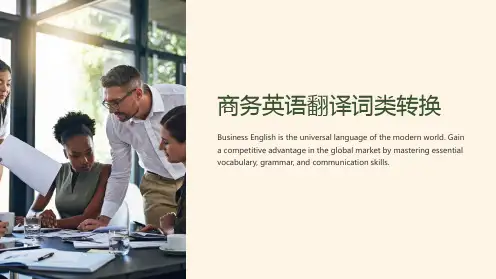
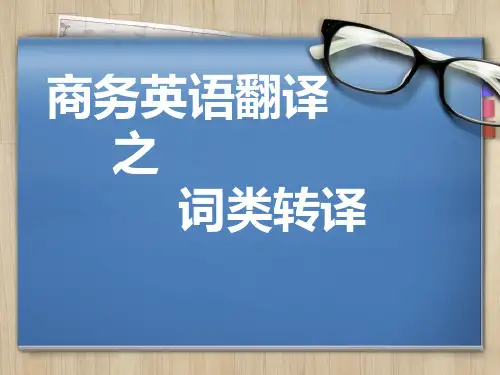

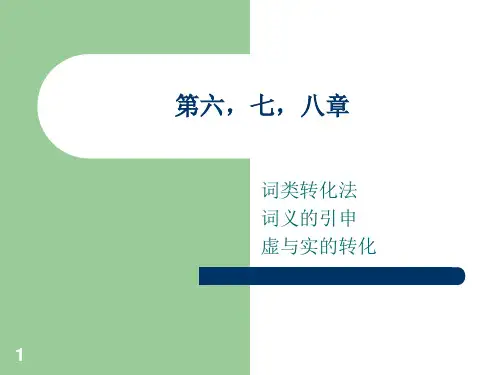
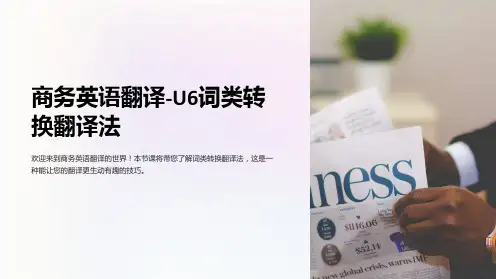
![商务英语翻译7.2词性转换、词的增减[精]](https://uimg.taocdn.com/cb04ab2a6bd97f192279e93a.webp)
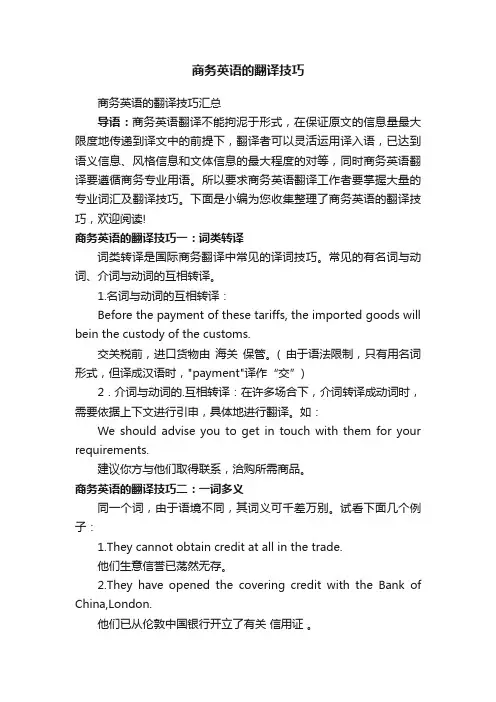
商务英语的翻译技巧商务英语的翻译技巧汇总导语:商务英语翻译不能拘泥于形式,在保证原文的信息量最大限度地传递到译文中的前提下,翻译者可以灵活运用译入语,已达到语义信息、风格信息和文体信息的最大程度的对等,同时商务英语翻译要遵循商务专业用语。
所以要求商务英语翻译工作者要掌握大量的专业词汇及翻译技巧。
下面是小编为您收集整理了商务英语的翻译技巧,欢迎阅读!商务英语的翻译技巧一:词类转译词类转译是国际商务翻译中常见的译词技巧。
常见的有名词与动词、介词与动词的互相转译。
1.名词与动词的互相转译:Before the payment of these tariffs, the imported goods will bein the custody of the customs.交关税前,进口货物由海关保管。
( 由于语法限制,只有用名词形式,但译成汉语时,"payment"译作“交”)2 . 介词与动词的.互相转译:在许多场合下,介词转译成动词时,需要依据上下文进行引申,具体地进行翻译。
如:We should advise you to get in touch with them for your requirements.建议你方与他们取得联系,洽购所需商品。
商务英语的翻译技巧二:一词多义同一个词,由于语境不同,其词义可千差万别。
试看下面几个例子:1.They cannot obtain credit at all in the trade.他们生意信誉已荡然无存。
2.They have opened the covering credit with the Bank of China,London.他们已从伦敦中国银行开立了有关信用证。
以上两个句子credit 词义都有所区别。
商务英语的翻译技巧三:词义引伸在商务英语翻译中,有时会遇到某些词在词典上难以找到贴切具体上下文词义,如生搬硬套,译文往往语意不清,甚至导致误解。
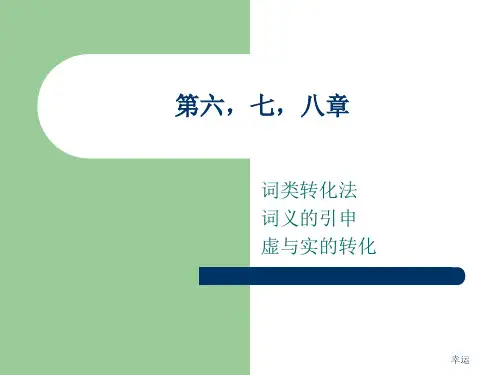
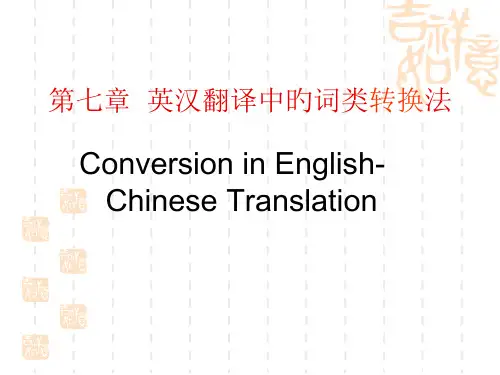
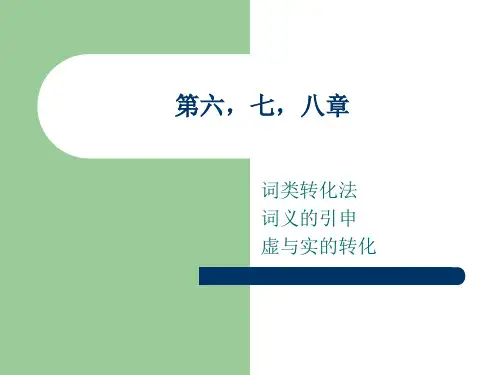
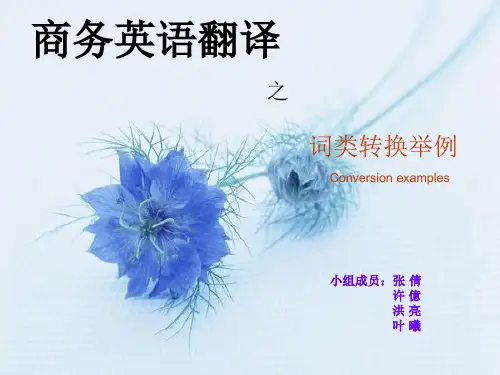
商务词类转译词类转换是翻译中常见的技巧。
就商务英语翻译而言,最常见的是名词、介词、形容词及动词间的互相转译。
一、名词与动词的互相转译研究表明:英语的名词在词汇中占有绝对优势,常用名词来表达汉语中用动词表达的概念(如抽象的行为名词) ,而且动词的兼类情况非常明显,加之英语有词形变化, 许多动词词尾加上后缀, 如-ment , - tion , - ance , - er , - or 等,即可变成名词。
相反,汉语却以动词占优势,而且一个句子不限于用一个动词,可以几个动词连用。
因此,英译汉时许多名词可译成汉语的动词;汉译英时动词也常译成名词(或介词+ 名词) 。
英语中具有抽象动作意义的名词汉译时常译成动词。
(1) The repeal of the Corn Laws by Great Britain in 1846 ended Britain′s long - standing policy protectionism.1846 年英国废除《谷物法》,结束了英国长期存在的贸易保护主义政策。
(2)And in a best - selling book ,Lester Thurow told us that America would soon be going head together with a Germanled Europe in the struggle for world markets.莱斯特·瑟罗在他的一本畅销书中断言,美国不久将要与德国领导的欧洲势均力敌地争夺国际市场。
原文中“struggle”为介词“in”的宾语,但汉语译文直接将它译成动词“争夺”,比原文来得更直接更传神。
(3) The first was the belief among many national leaders that the events leading to the Second World War were triggered by the Great Depression of the1930s,which in turn was believed to have been prolonged and deepened by the very high tariffs enacted by virtually all of the major trading nations during the early 1930s.有时在英译汉时,如将名词译成动词,则更易于处理。
商务英语名词化汉译的词类转换技巧商务英语名词化汉译的词类转换技巧词类转译是商务英语英汉翻译中常见的译词技巧,并且是英汉互译翻译实践中的重要手段之一。
下面是店铺分享的商务英语名词化汉译的词类转换技巧,欢迎大家阅读!一、问题和分析(一)商务英语汉译中存在的问题商务英语翻译课程是高职高专英语专业外贸和商务方向的核心课程之一。
“当今世界经济日益全球化,社会需要的人才是既懂英语又通晓商务知识的复合型应用人才,而商务英语翻译作为沟通中外经济、文化等的手段,其重要性更是不言而喻”。
名词化在商务英语中大量运用,体现了商务英语的文体特点。
但是由于商务英语中的名词化汉译难度较大,造成商务英语中文译文生硬、难懂,很难体现原文的文体特征。
(二)问题分析在我国,各个领域的专家学者对翻译标准的探讨从来没有间断过。
近代严复的“信、达、雅”标准,现代鲁迅的“力求易解”、“保存原作的风姿”标准,茅盾的“艺术创造性翻译”标准及傅雷的“神似”、钱钟书的“化境”等标准,都对翻译界产生过强烈的影响。
在各种翻译的标准和原则中,严复提出的“信、达、雅”最为广为人知。
在商务英语翻译的过程中译者应该做到对译本的信、达,即忠实、准确和通顺。
由于商务英语文本往往比较正式,修辞等也有约定俗成的表达,因此“雅”不作为商务英语翻译原则和标准的必需要求,除了一些特殊文本,如广告英语外,其他的文本翻译能雅则雅。
商务英语翻译中可以运用泰特勒的“翻译三原则”:第一,译作应完全复写出原作的思想;第二,译作的风格和手法应和原作属同一性质;第三,译作应具备原作所具有的通顺作为指导标准。
商务英语专业性强、逻辑严密、表达要求简练。
由于具有格式化、规范性的语言特点要求,商务英语的翻译自然不能像文学作品如诗歌等的翻译一样优美。
忠实原则要求,译文在意义和风格方面要忠实于原文,把原文完整而准确地表达出来,不随意进行改动、歪曲和增减;而通顺原则则要求译文通顺易懂,流畅自然,符合汉语的表达习惯,没有逐词死译、硬译的现象。
商务词类转译
词类转换是翻译中常见的技巧。
就商务英语翻译而言,最常见的是名词、介词、形容词及动词间的互相转译。
一、名词与动词的互相转译
研究表明:英语的名词在词汇中占有绝对优势,
常用名词来表达汉语中用动词表达的概念(如抽象的行为名词) ,而且动词的兼类情况非常明显,加之英语有词形变化, 许多动词词尾加上后缀, 如-ment , - tion , - ance , - er , - or 等,即可变成名词。
相反,汉语却以动词占优势,而且一个句子不限于用一个动词,可以几个动词连用。
因此,英译汉时许多名词可译成汉语的动词;汉译英时动词也常译成名词(或介词+ 名词) 。
英语中具有抽象动作意义的名词汉译时常译成动词。
(1) The repeal of the Corn Laws by Great Britain in 1846 ended Britain′s long - standing policy protectionism.
1846 年英国废除《谷物法》,结束了英国长期存在的贸易保护主义政策。
(2)And in a best - selling book ,Lester Thurow told us that America would soon be going head together with a Germanled Europe in the struggle for world markets.
莱斯特·瑟罗在他的一本畅销书中断言,美国不久将要与德国领导的欧洲势均力敌地争夺国际市场。
原文中“struggle”为介词“in”的宾语,但汉语译文直接将它译成动词“争夺”,比原文来得更直接更传神。
(3) The first was the belief among many national leaders that the events leading to the Second World War were triggered by the Great Depression of the1930s,which in turn was believed to have been prolonged and deepened by the very high tariffs enacted by virtually all of the major trading nations during the early 1930s.
有时在英译汉时,如将名词译成动词,则更易于处理。
例如:
(4 ) Early hopes that Eastern Germany could stage an economic miracle like that of West Germany in the 1950s and ′60s have faded.
统一之初指望东德能重演西德五六十年代经济奇迹的热情早已淡化。
本例说明了在东西两德统一初期,人民迫切希望东德的经济会迅速崛起。
但是,随着时间的推移,
人们已不再那样强烈地对此抱有幻想。
原文“hope”用复数, 但汉语中没有数的变化。
如将原文的“hope”译成名词,首先汉语动宾不搭配,我们平常不讲“希望淡化”,其次原文复数形式不好处理。
但将“hope”译成动词后,后边再添加“热情”一词来体现原文的预期,译文则更加自然。
(5)由动词加- a (e) nce , - tion , - ment 等词缀构成的名词,英译汉时常译成动词。
例如:
Resistance to market opening is basically a power play by leaders of industry.
抵制开放市场基本上是工业领袖们的实力较量。
(6) Utility is therefore related to our decision about priorities in production - particularly in a cent rally - planned economy.
因此,效用(经济术语) 对我们决定优先生产什么是有关系的,特别在中央计划经济中尤其如此。
(7)Much of the remainder of the GATT is designed to prevent evasion of the tariff obligations of Article II by the use of nontariff barriers.
例中的“decision”、“production”皆为介词宾语,前者如用“decide”则与“priorities”动宾搭配不当,所以不宜用动名词形式;“in production”指一种过程,“produce”为及物动词,一般要跟宾语。
所以,也不适宜使用动名词。
第7 例中的“evasion”前为及物动词“prevent”,它的基本用法是“prevent sb. (f rom) doing sth. ”。
“evasion of tariff obligations ”这一结构却是动宾关系,也不适合用动名词。
(8)Before the payment of these tariff s, the imported goods will be in the custody of the customs and storage charges are for the impor ter’s account .
交关税前,进口货物由海关保管,存储费由进口商负担。
(9) In reimbursement of these extra expenses, please draw on us.
请开汇票向我方支款,用于偿付这些额外费用。
上两例均由于语法限制,只有用名词形式,但译成汉语时,“payment”和“reimbursement ”分别译作“交”和“偿付”。
二、介词与动词的互相转译
英语介词是英语中非常重要的一种“功能词”
(functional words) ,用于表示词与词之间的语法关系,组成一些语法结构。
英语介词不仅数量多(大约280 多个) ,而且与其他词类的搭配灵活(名词、代词、动名词、从句均可作它们的宾语,个别介词后还可跟形容词) ,词汇意义丰富。
而汉语的介词大部分是由动词虚化而来的,许多介词仍兼有动词词性,因此汉译英、英译汉时应时刻注意两者的区别,正确地加以处理。
例如,在“他在教室里”一句话中,“在”
是动词,译成英语时要用“系动词+ 介词短语”这种结构,译作He is in the classroom。
此外,之所以说英语介词具有丰富的词汇意义,
是因为它们由于搭配不同,其意义也不相同,而且可以表达汉语中常用动词来表达的意义。
因此,英汉互译过程中,两种语言的介词和动词常可以互相转译。
为说明这一点,请看下面各例:
(1) We should advise you to get in touch with them for your requirement s.
建议你方与他们取得联系,洽购所需商品。
(2) Bill Clinton’s first 100 days will be fill ed with momental battles over the budget deficit and health care reform.
比尔·克林顿上任后的头100 天里将充满削减预算赤字和推行医疗费用改
革的激烈战斗。
(3) But when the smoke clears , he’s likely tolook up and find himself staring at another giant challenge - fending off a new round of international t radewars and , perhaps , pressure for protectionism athome.
但是,当硝烟散尽,他可能发现自己正面临另一场巨大的挑战———新一轮国际贸易战,也许还有国内要求实行贸易保护主义的压力。
从上面各个译例来看,在许多场合下,介词转译成动词时,需要依据上下文进行引申,具体地进行翻译。
至于译者能否恰当地将汉语译成英语介词,要看译者英语功底如何。
因此,有许多学者认为,能否正确运用介词是检验能否掌握现代英语的一个尺度。
三、形容词与动词的互相转译
有时,形容词也能转译成动词。
例如:
(1) And we would recommend subsidies ,consistent with GATT ,only for a demonstrably competitive industry whose products are used in a variety of manufactured goods.
我们建议在进行补贴时,要符合关贸总协定的规定,并只限于明显有竞争力、其产品用于加工各种制成品的产业。
(2) The export trade is subject to many risks.
出口贸易常遇到许多风险。
英汉互译过程中,词类转译是一种极为普遍的现象。
上面只是简要地介绍了其中比较突出的几种。
一位有经验的译者,应能灵活自如地进行翻译,
而不拘泥于原文的字句。
初学者则应加强英汉双语的修养,这样才能译得活,译得好。